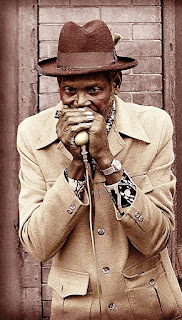BIG WALTER HORTON/ Complete Recordings 1951-66
I guess it's certainly not necessary to present Big Walter Horton, also named Shakey Horton, to the followers of my blog. His reputation is very very high among blues buffs all around the world and particularly among harmonica players and fans for whom he is considered as one of the most accomplished and influential blues harp players of all times.
Heavy or
piercing, hazy or precise, the harmonica playing of this "Big" Walter
– the main competitor of the other Walter, the so called "Little" –
is almost always full of feeling and imagination. Many of his solos are masterpieces
and now classics of the genre and have been heavily emulated up to those days.
Although most
of his biographies mention his birth date as 6th April 1918 at Horn
Lake, Arkansas and Blues/ A regional
experience gives a birth certificate (for a named Harton) from September 1921,
Big Walter has always appeared to all who saw him, including yours truly, as a
much older man than that.
Walter was certainly neither a leader nor a very reliable informant and during most of his career he was equally not a very reliable band player, the stories about how he didn't show at a gig or quit during the middle of a performance abound. And this certainly explains why he never reached any stardom, not even being able to make a living out of his music.
But of course
when he was playing or recording, Big Walter was certainly a huge master of his
instrument.
I had the
opportunity to see him quite often while he was touring
Anyway, this
compilation tries to gather all the recordings he made under his name during
the years 1951-66, from his early days in
After 1966,
Walter made a handful of albums for Alligator (maybe his very best) and with
several young (at that time) bands like Hot Cottage or John Nicholas' and even
appearing in the best selling album Fleetwood
Mac/ Blues jam at Chess. All of those are very worthwhile.
Walter died in



